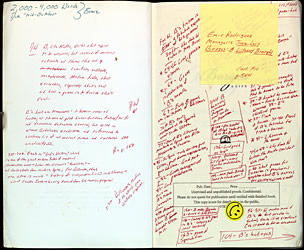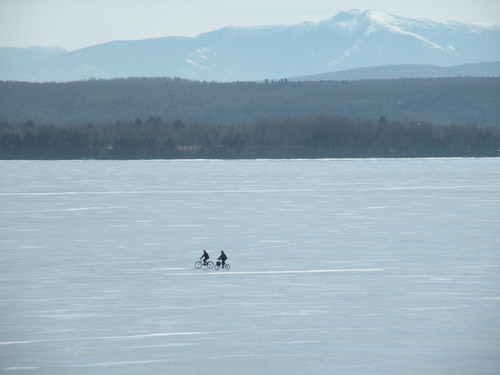Marginalia in David Foster Wallace’s Books

via hrc.utexas.edu
Check out David Foster Wallace’s marginalia: This is an annotated copy of Edwin Williamson’s Borges: A Life. Harry Ransom Center.

via hrc.utexas.edu
Check out David Foster Wallace’s marginalia: This is an annotated copy of Edwin Williamson’s Borges: A Life. Harry Ransom Center.
If your head is still spinning after 2009’s triple digit growth rate, you’ll need a clamp to steady your skull when you read that January 2010 e-book sales posted a nearly 370% jump over the same month in 2009, according to the International Digital Publishing Forum and the Association of American Publishers. The numbers are $31,900,000 for January ’10 compared to $8,800,000 for January ’09. January was also the biggest e-sales month ever, and it wasn’t even close. The biggest month to date was December ’09 at $19,100,000. (booktrade.info)
Hat tip to http://twitter.com/iainbroome for the link to this upbeat news.

Here’s a quick overview of just who the Big Six [publishers] are [and] where they fit in the modern corporate world.
Hachette Book Group (formerly Warner Books)
HarperCollins (owned by Ruper Murdoch’s News Corp)
MacMillan Publishers Ltd
Penguin Group
Random House (largest English-language trade publisher in the world)
Simon & Schuster (owned by the CBS Corporation)
Michael Arrington’s recent TechCrunch post about old media “guys” who don’t get it made me realize how far things have come — and how much better they’ve gotten — in the world of journalism.
The Way Things Were (Wrong)
Why, for example, could we could lift from other sources without offering attribution? I remember when a librarian at ABC News taught us how to use news databases to find stories from local media that could serve as grist for our mill. On another occasion, I pretty much re-reported a Japanese magazine’s story for Newsweek. The Japanese magazine’s editor called me out privately, but I never paid any further price…
The Equation Is Changed
I remember… the first real-time chat between people in China and a major news website… the experience was raw, unfiltered and direct from the source — without any correspondent to tell us what was being said. The unlimited space, flexibility of time, and ability to bring others into the conversation broke down the barriers that the journalist can place, even inadvertently, between those involved in the news and those interested in it…
Change for the Good
Access to information has, obviously, improved as well. Search engines such as Google and myriad other information sources, from Twitter and Facebook to Digg and Delicious, have made it easier to be sure we don’t miss what’s relevant. They can also enable us to find serendipitous links that take us on new journeys. Sure, there’s still proprietary information locked up in Factiva, Nexis and Bloomberg terminals, but you’d be hard-pressed to convince me we have less access to good information today than we did before the web.
Accountable advertising
Today, in digital media, advertisers can at least tell if their ads have been served to (and presumably seen by) a viewer…
Read the full post at pbs.org
Hat tip to Dorian Benkoil at MediaShift for this insightful post about the merits of new media (despite his preference to stop calling it that.) These highlights gloss some of his insightful examples, so you’ll want to read the full post over at PBS.org. I’m especially drawn by his emphasis on attribution/transparency and the idea that it’s become so much easier for real people to share their unfiltered experience in real time. Less clear to me is his assertion that, “Journalists are also now held to a higher standard, and have to be more transparent.” I hope this is true, but I’m not always as confident as he is. Do you agree that today’s journalists are obliged to be more transparent and distort information less than in the past?

Photograph via twitpic.com
This arresting photograph of two bicyclists riding across the frozen surface of Lake Champlain captures the North Country spirit quite elegantly. And who says we put away our bikes when the snowflakes begin to fall. I have a friend who commutes an hour plus to work and then repeats the ride in the evening on a mountain bike with steel studded tires throughout the winter. In snowstorms. On icy roads. Up and down hills. Makes this photo seem like a leisurely meander…
Good morning. Another sleepless night. And another spectacular morning. Just recompense. I’ve grabbed a brief video of the sun rising up out of the clouds above Vermont’s Green Mountains, above Lake Champlain that I’m adding to my Essex, New York flickr set. Nice that I couldn’t even remember what the date was…
Sorry that the quality is “poor”. I shot this on my Blackberry Storm2 through antique wavy glass. The result is a little bit dreamy.


Photograph courtesy of Sydney Eye
An earnest folk-singer, in cavernous Martin Place, competes with a “burger with-the-lot”, for the attention of lunch time strollers. Better were she a plate juggling sword swallower, than guitar player.
Flaneur (n). A person who strolls the city in order to appreciate it.
Are YOU a flaneur – a la Baudelaire or Sontag?
View original post at Sydney Eye…
A little-known fact is that people wearing sunglasses never notice when you stare at them. Or, rather, you can’t see them noticing you, which amounts to the same thing: immunity to stare. [via Georgia Love.]


Photograph courtesy of Getty Images via Wall Street Journal
Apple is still working to secure content for the iPad with just weeks to go before the tablet computer’s release, said people familiar with the matter, as the company tempers some of its initial ambitions for the much-hyped device.
Today, Facebook co-founder and My.BarackObama.com alum Chris Hughes announced the soft launch of Jumo, his new philanthropic start-up that works to match do-gooders with appropriate causes.
Currently, the Jumo site is merely an elegantly designed homepage that announces Hughes’s mission to “bring together everyday individuals and organizations to speed the pace of global change. We connect people to the issues, organizations, and individuals relevant to them to foster lasting relationships and meaningful action.”
via mashable.com